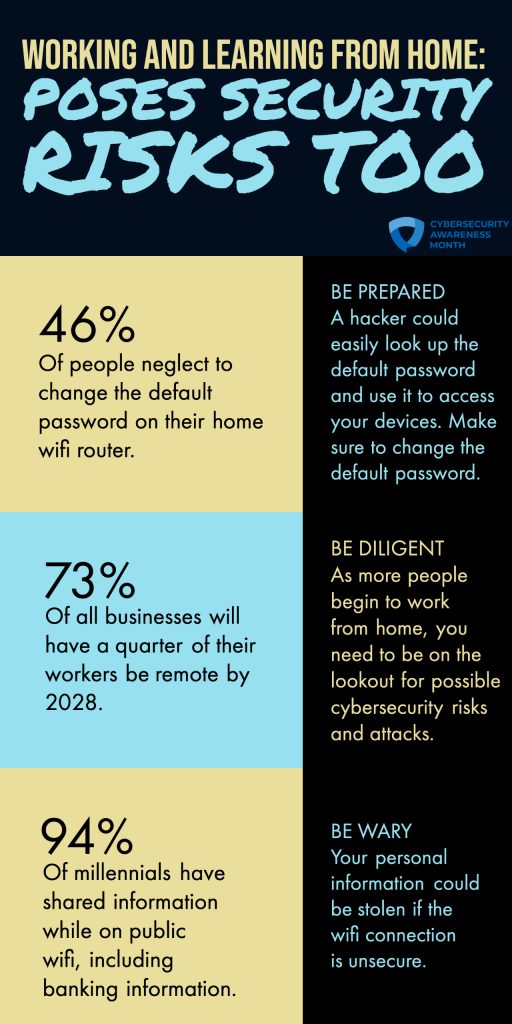2020 saw a major disruption in the way many work, learn, and socialize online. Our homes are more connected than ever. Our businesses are more connected than ever. With more people now working from home, these two internet-connected environments are colliding on a scale we’ve never seen before, introducing a whole new set of potential vulnerabilities that users must be conscious of.

Here are a few ways to shore up security while working from home:
- If you need to leave your home for supplies or other reasons, make sure your work devices are either shut down or locked. If you live with a roommate or young children, be sure to lock your computer even when you step away for just a bit.
- If you can’t carve out a separate workspace in your home, be sure to collect your devices at the end of your workday and store them someplace out of sight. This will not only keep them from being accidentally opened or stolen but will also help to separate your work life from your home life.
- Access to your computer’s desktop should at least be password-protected, and the password should be a strong one. If the system is stolen, this will keep the thief from easily accessing company information.
- Try to keep work and personal devices separate if possible. Do you have a child being homeschooled now and turning in digital assignments? Are you ordering groceries and food online to avoid stores? Best not to cross those hairs with work. While it may seem cumbersome to constantly switch back and forth between the two, do your best to at least keep your main work computer and your main home computer separate (if you have more than one such device).The more programs and software you install, the more potential vulnerabilities you introduce.
- Secure your home Wi-Fi with a strong password. Access to the settings on your home router should also be password protected as well. Be sure to change the default password it came with.
- Be wary of phishing emails. There will be many going around trying to capitalize on fear related to the coronavirus, questions about isolation and its psychological impacts, or even pretending to offer advice or health information. Scan those emails with a sharp eye and do not open attachments unless they’re from a known, trusted source.
- For more tips please check out: Working from Home Security Tips
SIMPLE TIPS TO SECURE DEVICES
Get Savvy About Wifi Hotspots. Public wireless networks and hotspots (like those found at a coffee shop or restaurant) are not secure, which means that anyone could potentially see what you are doing on your laptop or smartphone while you are connected to them. Limit what you do on public WiFi, and avoid logging in to key accounts like email and financial services. Consider using a virtual private network (VPN) or a personal/mobile hotspot if you need a more secure connection.

Back It Up. Protect your valuable work, music, photos, and other digital information by making an electronic copy and storing it safely. If you have a copy of your data and your device falls victim to ransomware or other cyber threats, you will be able to restore the data from a backup. Use the 3-2- 1 rule as a guide to backing up your data. The rule is: keep at least three (3) copies of your data, and store two (2) backup copies on different storage media, with one (1) of them located offsite. We highly recommend using Google Drive as a backup location, as well as Google File Stream on Daemen owned computers for easy access to Google Drive files.
When In Doubt, Throw It Out. Links in email, tweets, texts, posts, social media messages, and online advertising are the easiest way for cybercriminals to get your sensitive information. Be wary of clicking on links or downloading anything that comes from a stranger or that you were not expecting. Essentially, just don’t trust links. If you do accidentally click on a suspicious link please contact Daemen IT. For more information please check out: How to Detect Phishing Emails as well as Think You’ve Been Hacked?
